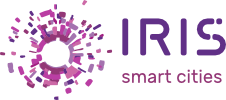
Eight students of Utrecht University School of Economics (U.S.E.) used the final project of their studies to take a deep-dive into several of the IRIS smart city projects. Two of the students graduated with a Bachelor degree in Economics and Business Economics, the other six students graduated with Master degrees in International Management, Business Development and Entrepreneurship, and International Economics and Business.
Citizens in Smart City Projects
The thesis by Lenne Omlo, Citizens in Smart City Projects – Exploring the far-reaching role of citizens in Smart City projects and how to embrace this role in its planning, esearches how citizen participation can be strengthened with business models.
> Read the thesis
Mobility as a Service Solutions and their Ecosystems
Britt Kuipers’ report Replication of Smart City Projects – Comparing two Mobility as a Service solutions and their ecosystems researches the mobility services We Drive Solar and EC2B in the cities of Utrecht (Netherlands) and Gothenburg (Sweden). Could a Smart City business model’s replicability potential to other cities be assessed by relying on local and generic conditions?
> Read the thesis
Smart City startups – A Comparison between Utrecht and Nice
The thesis Smart City start-ups – Comparative analysis between Utrecht and Nice, written by Martina Picari, compares the performance of smart city startups in the European cities of Utrecht and Nice and examines the role of business incubation.
> Read the thesis
Human Capital in Start-ups
What role does human capital play in the success of smart city startups? The thesis Founders’ human capital and technology-based start-ups:
Determinant of success? – written by Maaike Hermse – researches the role education and work experience on the basis of three success factors.
> Read the thesis
Business Incubation and Corporate Entrepreneurship Processes
Supporting smart city initiatives is central to the thesis A Comparative Study of the Business Incubation and Corporate Entrepreneurship Processes in the Context of Smart City Innovation, written by Kateřina Válková. The thesis offers practical tools and new research directions for this purpose.
> Read the thesis
Enhancing Smart City Replication
The thesis Enhancing Smart City Replication by Adopting an Entrepreneurial Ecosystem – A Case Study by Julian Bammer researches how we can encourage and replicate smart city initiatives in other European cities. Can an ecosystem that supports a bottom-up, entrepreneurial-driven approach help to overcome the challenges of smart city replication?
> Read the thesis
Smart City Start-ups: Performance after Business Incubation
Imke Nijland’s report Smart City Start-ups: Performance after Business Incubation in Utrecht and Gothenburg researches the performance of smart city start-ups compared to non-smart city start-ups after business incubation.
> Read the report
Smart City Start-ups and Entrepreneurial Ecosystems
How do elements of the entrepreneurial ecosystem contribute to the presence of smart city startups, and what does this mean for ecosystems in which more smart city innovation is desired? The thesis Smart City Start-ups and Entrepreneurial Ecosystems, written by David Mooij, analyzed 273 NUTS 2 regions in Europe and shows that most elements of the entrepreneurial ecosystem are not individually related to the presence of smart city startups.
> Read the thesis
18 Sep 2020

